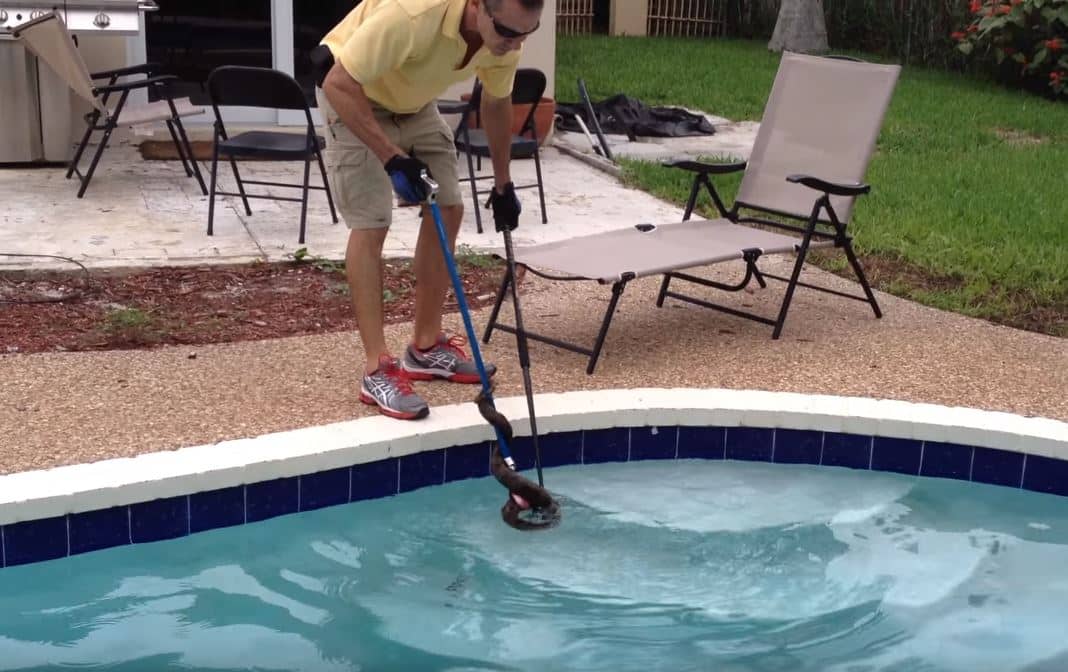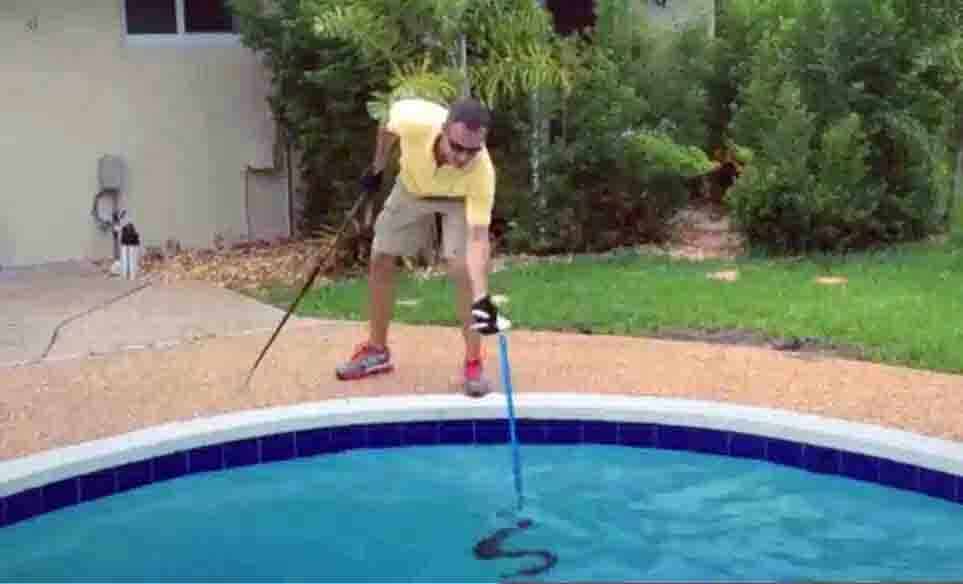What To Do About Snakes in the Pool
A snake in the pool can be a surprise. The following article will explore this situation and what a pool owner can do about it. By the end of the article, you will understand more about why this happens and what you can do if you find a snake in your swimming pool.
Why Is There a Snake in the Pool?
Snakes will be drawn to the water in your pool for various reasons. In the warm summer months, pools offer snakes a way to keep cool. In the winter months, heated swimming pools are more popular with snakes.
Water can also help a snake soften its old skin when it is time to molt. The water makes the shedding process a bit easier.
Finally, there is no change in the water chemistry by having a snake in your pool. There is no need to chemically “shock” the pool — we just wanted to mention this as it is a concern we run into rather frequently.
Even though I find many snakes swimming around in my pool, they mostly end up in the skimmer. If the pool pump is off, they will be free to swim out, but for the most part, snakes that end up in the pool will eventually get pulled into the skimmer.
If there are snakes in your area, you should always be very careful when cleaning out pool skimmers.
Is the snake dead or alive?
Sometimes the snake will be alive, but many times the exposure to chlorine and the snake’s incapacity to free itself from the skimmer will cause its death. Although snakes will try their best to get out of the pool, it is often too difficult for them to make the jump.
How to Remove a Pool Snake

1. Use a Net
If the snake is still in the pool and actively swimming about it, you can remove it with a net on a long stick. If all you have is a pole, the snake will cling to this, trying to get out. Then you can release the snake at the most convenient location.
2. Watch the Skimmer and Wait It Out
If you notice a snake in the pool but lack the proper equipment to get it out, you may just have to wait till it becomes stuck in the skimmer. Again, remember that the snake is probably scared and trying hard to get out of the pool, but simply can’t. The pool jets are designed to move the water in the pool in a single direction. This is in through the skimmers and out through the jets. Eventually, snakes always seem to end up in the pool skimmer.
3. Remove the Skimmer Basket
Once the snake has made its way into the basket, all that is needed now is to remove the basket. The basket is close to the snake, so don’t use your hand to remove the basket. The frightened snake might attack. Try using a pole to lift the basket from its handle. Then dump the snake out where it will not be harmed or harm anyone else. If the skimmer has large enough spaces to allow the snake to pass, it could be in the pool pump basket.
How to Keep Snakes Out of the Pool
Use Chemical Barriers — a granular sulfur-based repellent that can keep snakes from venturing near the pool area is laid out around the pool’s perimeter.
Use Natural Products — instead of toxic granular sulfur, try something non-toxic. White vinegar or ammonia can also be poured around the perimeter of your pool. Cinnamon and clove oils are also effective repellents. Mix these with dish soap (3 tablespoons), water (1 liter), and essential oils 5 to 10 drops.
Use Physical Barriers — screen netting across the enclosures is an effective way to thwart snakes attempting a dip in the pool. Make sure this netting is flush with ground level.
Clean the Yard — keeping your lawn clear and clean is an excellent way to reduce snakes in your garden. Snakes will be more attracted to an unkempt garden that offers plenty of places to conceal themselves. If there are snakes in your garden, pick up toys, trim back bushes, and rake in the leaves regularly. This makes your garden incredibly unattractive to local snake populations.
Employ Predators — dogs and cats are great hunters. Their territorial markings will often be enough to ward away a snake presence. Be very careful, though, neither dog’s not cats are immune to the deadly venom of a snake. It is good to keep antivenom on hand in regions where snakes exist.
Invite Company — snakes hate the sounds of populated areas. If you have a strong human presence in your garden and pool, snakes will stay away from these areas for their own safety.
No snake will intentionally enter the human property if they can help it.
Reduce Food Sources — snakes are predators, and if your home is a potential source of food, you may invite a snake presence. Rodents are a favorite food for snakes, so keep these pets clear from your house — or nature may send its natural exterminators to do this for you.
Frequently Asked Questions
Can snakes swim?
All snakes are naturally at home in the water, and even the most land-loving snakes will take a dip if they can. But eventually, they will tire and need to return to land. This is why pools are not safe for them.
Do pools attract snakes?
Yes, even non-water snakes will enjoy a quick swim for cooling, warming, or shedding their skin. Water is also a natural hunting ground for snakes.
Do I need to clean the pool after finding a snake in it?
Unless the snake has died and is putrefied to an alarming degree, there is usually no need to clean or treat your pool if a snake has made its way there.
Is chlorine okay for snakes?
Chlorine is an especially poisonous substance for snakes. Even though they may be attracted to the pool water, it could kill them.
The Last Resort
For the most part, it is small harmless snakes that fall afoul of the pool. But if you do find a poisonous snake, or an especially large snake-like a cobra, anaconda, or boa constrictor, you will want to call Wildlife Removal Services to help remove the beast.

